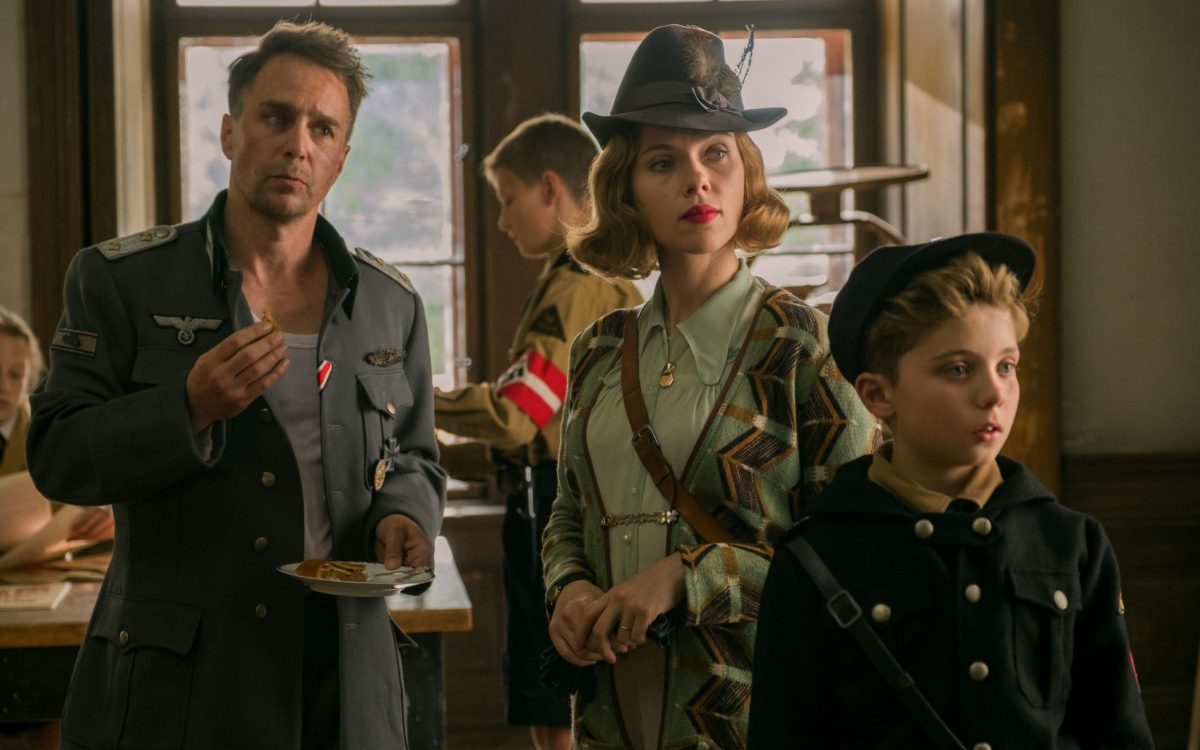![]() It’s bad form to critique an ad-campaign instead of the film, but the central liability of Taika Waititi’s “Jojo Rabbit” is its own inability to recognise itself. Since its premiere in September at the Toronto Film Festival, where it won the coveted Grolsch People’s Choice Award, “Jojo Rabbit” has announced itself as “an anti-hate satire”. The phrase has been splashed across posters and interviews, suggesting a level of bluntness and obviousness that’s hard to shake. There are few “pro-hate” satires, so the ad-campaign’s assurance that it is “anti-hate” seems fuelled by a lack of trust in its own self. And, although this film, about a ten-year old Hitler Youth member who idolises Hitler, but is forced to rethink his ideology when he finds out his mother is hiding a Jewish girl in their attic, utilises irony and satirical elements throughout “Jojo Rabbit” is best described as emphatically satirical. Even as the broadest moments of the film have dominated its ad campaign over the last few months, up to its recent six Oscar nominations, “Jojo Rabbit” is much more thoughtful and complex than the broadness of its campaign suggests. And, more specifically, the value of the reveals itself for what it truly is – an incredibly perceptive coming-of-age story.
It’s bad form to critique an ad-campaign instead of the film, but the central liability of Taika Waititi’s “Jojo Rabbit” is its own inability to recognise itself. Since its premiere in September at the Toronto Film Festival, where it won the coveted Grolsch People’s Choice Award, “Jojo Rabbit” has announced itself as “an anti-hate satire”. The phrase has been splashed across posters and interviews, suggesting a level of bluntness and obviousness that’s hard to shake. There are few “pro-hate” satires, so the ad-campaign’s assurance that it is “anti-hate” seems fuelled by a lack of trust in its own self. And, although this film, about a ten-year old Hitler Youth member who idolises Hitler, but is forced to rethink his ideology when he finds out his mother is hiding a Jewish girl in their attic, utilises irony and satirical elements throughout “Jojo Rabbit” is best described as emphatically satirical. Even as the broadest moments of the film have dominated its ad campaign over the last few months, up to its recent six Oscar nominations, “Jojo Rabbit” is much more thoughtful and complex than the broadness of its campaign suggests. And, more specifically, the value of the reveals itself for what it truly is – an incredibly perceptive coming-of-age story.
From the opening scene, “Jojo Rabbit” is marked by a level of barely contained chaotic comedy. Jojo Betzler prepares for a weekend at Hitler Youth camp, hyping himself up with his imaginary friend – Adolf Hitler, the opening scene ending in a series of “Heil Hitler!” shouts that amuses for its ridiculous. Much of the next 19 minutes follows that same irreverent, often breakneck, tone. Jojo moves from home to Hitler Youth camp to the hospital and home again all with a propulsive comedic verve that feels almost fantastical, and impossible to sustain, and then at the 20-minute mark the film immediately halts. Demoted to delivering propaganda after an accident at camp Jojo walks through the streets, delivering his leaflets with his mother Rosie. The impish score suddenly stops and silence overwhelms the film as we cut to a shot of Rosie staring ahead, and the revere-shot reveals a shot of five hanged citizens, their arms bound behind them, executed for their anti-Nazi sentiments.
It’s the first shot in the film that holds no humour or warmth, instead punctuated by a jolt of seriousness that feels out-of-place. Even Jojo cannot take it. “Yuck,” he says as he looks away. But Rosie insists he look, turning his head back to take in the spectacle. It’s an essential moment in “Jojo Rabbit”, a moment that immediately reveals Waititi’s clear focus and control of the film (he writes, directs and stars in the film playing the imagined Hitler). Later in the film there will be two key moments where silence overwhelms the screen and whimsy cannot be sustained, moment where the very childish Jojo must decide whether to grow up or remained ensconced in his fantastical world of pro-Nazi fervour. And, it’s Waititi’s ability to deliver broad, chaotic laughter in a film that features chilling moments of despair that feel truest to the film’s central ideology – a young boy very much holding on to the ridiculous of childhood, unwilling or unable to see the inherent danger in the things he loves.
In this way, even as Jojo (an excellent Roman Griffin Davis in his film debut) spends the film juggling relationships – his rocky relationship with Elsa, the Jewish stowaway; his imaginary friendship with Hitler who acts as the opposite of conscience; and his paternalistic relationship with Captain Klenzendorf who runs the Hitler Youth programme – Jojo’s coming-of-age depends on the relationship with his mother. And it is on Scarlett Johansson’s performance as Rosie that Waititi hangs the most complex and ambitious intentions of “Jojo Rabbit”. Like the film, Johansson’s performance is one that is immediately paradoxical, simplistic at first but more complex as it opens up. It’s instructive, then, that the most ambitious scene in this film about a Nazi youth, is one that focuses on micro relationships that macro political points. The film’s ideology is not so much that “not all Nazis are bad”, but a more ambivalent one that we do good, not always for altruistic reasons, but to do justice to the people we care about.
Forty minutes into the film, Jojo and Rosie have an argument. Frustrated with his mother’s inability to sympathise with his sadness about not being a Nazi soldier he complains, “If my father were here, he’d get it.” Rosie storms out of the room, at this, reappearing a few seconds later wearing an oversized coat, with soot on her chin to imitate a beard. She is now Jojo’s father, who is off somewhere in Europe, presumably fighting. What follows is a scene that toes the line between farce, ridiculousness and tragedy as Rosie has a conversation with her son as herself and her husband. In a film where a ten-year old burgeoning Nazi walks around with an imaginary Adolf Hitler as his closest friend, it’s surprising that this moment feels like the riskiest one. And, yet, the moment – where Scarlett Johansson as Rosie must carry the weight of an impossibly complex but opaque character on her shoulders is a reminder of how more complex “Jojo Rabbit” is than the first glance might suggest. The silliness of the set-up is immediately evaporated both by Johansson’s firm ability to play both the realist, earnestness of a single-mother in Nazi Germany, but who is game enough to be on the zany wavelength of Waititi’s penchant for the bizarre.
It’s that kind of push and pull that marks “Jojo Rabbit”, throughout. Towards the end one of the child soldiers cries, complete with an irreverence tongue-in-cheek quality, “It’s not a good time to be a Nazi.” It’s amusing, if on the nose. But just when the film gives way to blunt obviousness, it also has the capacity to devastate and inform with subtle moments where it utilises a visual motif to excellent results (there’s a scene with a butterfly that’s incredibly profound). This is a film with an incredibly cogent idea of what it wants to do – not just on a thematic level, but on a visual level. The paradox of “Jojo Rabbit”, and the credit to Waititi, is that a film that feels so genuinely spontaneous from moment to moment, also reveals itself as incredibly worked out. On an aesthetic level, musically, sonically, visually, Waititi has a clear focus on motif and foreshadowing, revealing a film that reflexes and reflects upon itself. “Jojo Rabbit” may not be as emphatically daring as its ad campaign may suggest, in fact that the concept of presenting Hitler as a buffoon is the least interesting part of it. Instead, the film builds its value from its stylistic thoughtfulness and its clear-eyed vision of a boy who must become a better man.








